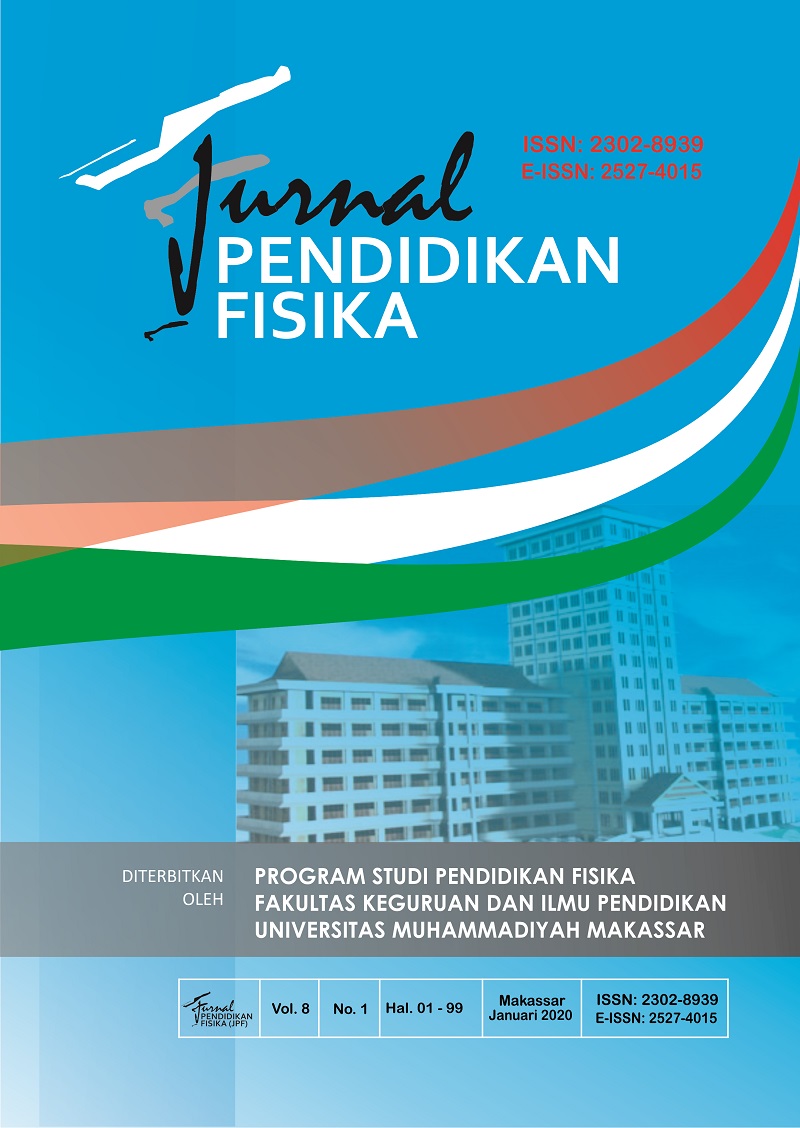The Influence of Virtual Labs on the Students’ Learning Outcomes and Scientific Attitudes at Physics Education Study Program Flores University
DOI:
https://doi.org/10.26618/jpf.v8i1.2831Kata Kunci:
Virtual Lab, Learning Outcomes, Scientific AttitudeAbstrak
This study aims to determine learning outcomes and the scientific attitudes of students at physics education study programs using virtual lab. This type of research is quantitative research. It uses descriptive statistical analysis and inferential stattistics to illustrate data learning outcomes and the scientific attitudes of students at physics education study Universitas Flores using the virtual lab. Data collection techniques used in this study were test for learning outcomes and observatory techniques for the scientific attitude. From the results of descriptive analysis for learning outcomes, it shows that the average is 75,05 in the enough category. The results of inferential statistics show t count is 2,770, sig(2-tailed) 0,011. Because the sig(2-tailed) value of 0,011 is smaller than 0,05, thus it can be concluded that use of the virtual lab influences the learning outcomes. For the scientific attitudes it shows that the average is 76,14 in the enough category. The results of inferential statistics show t count is 3,875, sig(2-tailed) 0,001. Because the sig(2-tailed) value of 0,001 is smaller than 0,05, thus it can be concluded that use of the virtual lab influences the scientific attitudes of students at physics education study Universitas Flores.
Keywords: Virtual Lab, Learning Outcomes, Scientific Attitude
Penelitian ini bertujuan untuk mengetahui hasil belajar dan sikap ilmiah mahasiswa program studi pendidikan fisika Universitas Flores dengan menggunakan virtual laboratorium. Jenis penelitian ini adalah penelitian kuantitatif , dengan analisis statistik deskfiptif dan statistik inferensial untuk menggambarkan hasil belajar dan sikap ilmiah mahasiswa program studi pendidikan fisika Universitas Flores menggunakan Virtual Laboratorium. Instrumen yang digunakan dalam penelitian ini adalah instrumen tes untuk mengukur hasil belajar serta lembar observasi untuk mengukur sikap ilmiah mahasiswa program studi pendidikan fisika. Dari hasil analisis deskriptif untuk hasil belajar menunjukkan bahwa rata-rata hasil belajar mahasiswa adalah 75,05 dalam kategori cukup, sedangkan hasil statistik inferensial menunjukkan nilai t hitung 2,770, sig(2-tailed) 0,011. Karena nilai sig(2-tailed) 0,011 lebih kecil dari 0,05 hal ini menunjukkan bahwa penggunaan virtual laboratorium berpengaruh terhadap hasil belajar fisika mahasiswa program studi pendidikan fisika Universitas Flores. Untuk sikap ilmiah berdasarkan analisis deskriptif menunjukkan bahwa rata-rata 76,14 dalam kategori cukup, sedangkan hasil statistik inferensial menunjukkan nilai t hitung 3,875, sig(2-tailed) 0,001. Karena nilai sig(2-tailed) 0,001 lebih kecil dari 0,05 hal ini menunjukkan bahwa penggunaan virtual lab berpengaruh terhadap sikap ilmiah mahasiswa program studi pendidikan fisika Universitas Flores.
Kata kunci: Virtual Laboratorium, Hasil Belajar, Sikap IlmiahReferensi
Reismeiyanto. 2011. Pembelajaran Multimedia. Jakarta: Widyadara
Hamdani. 2011. Strategi Belajar Mengajar. Pustaka Setia.
Darsono. 2010. Belajar dan pembelajaran. Semarang: IKIP Press.
Sugandi, Ahmad. 2011. Teori Pembelajaran. Semarang: UPT MKK UNNES.
Komalasari, Kokom. 2013. Pembelajaran Kontekstual: Konsep dan Aplikasi. Bandung: PT Refika Adiatama.
Amaliah, N., & Karim, S. 2019. Penerapan Metode Pembelajaran Accelerated Learning Berbantuan Media Bermain Kartu Kuartet untuk Meningkatkan Hasil Belajar dan Minat pada Pembelajaran IPA Peserta Didik SMP Negeri 1 Barru. JPF: Jurnal Pendidikan Fisika Universitas Muhammadiyah Makassar. Vol 7, No 3, 276-290.
Sudjana, Nana. 2010. Penilaian hasil Proses Belajar Mengajar. Bandung: PT Remaja Rosdakarya.
Liu, A,. & Ilyas. 2019. Pengaruh Penggunaan Alat Peraga Pasco Scientific terhadap Hasil Belajar dan Sikap Ilmiah Mahasiswa Program Studi Pendidikan Fisika Universitas Flores. JPF: Jurnal Pendidikan Fisika Universitas Muhammadiyah Makassar. Vol 7, No 3, 325-332.
Fatonah, Siti dan Prasetyo, Zuhdan.K. 2014. Pembelajaran Sains. Yogyakarta: Penerbit Ombak.
Anwar, Herson. 2009. Penilaian Sikap Ilmiah Dalam Pembelajaran sains. Jurnal Pelangi Ilmu Vol 2, No 5 Mei 2009
Unduhan
Diterbitkan
Terbitan
Bagian
Lisensi
Copyright:
Authors who publish with this journal agree to the following terms:
1. Authors retain copyright and grant the journal right of first publication with the work simultaneously licensed under a Creative Commons Attribution-ShareAlike 4.0 International License that allows others to share the work with an acknowledgement of the work's authorship and initial publication in this journal.
2. Authors are able to enter into separate, additional contractual arrangements for the non-exclusive distribution of the journal's published version of the work (e.g., post it to an institutional repository or publish it in a book), with an acknowledgement of its initial publication in this journal.
3. Authors are permitted and encouraged to post their work online (e.g., in institutional repositories or on their website) prior to and during the submission process, as it can lead to productive exchanges, as well as earlier and greater citation of published work.
Licence:
Authors are free to:
1. Share: Copy and redistribute the material in any medium or format
2. Adapt: Remix, transform, and build upon the material for any purpose, even commercially.
The licensor cannot revoke these freedoms as long as the authors follow the license terms, which include the following:
1. Attribution: You must give appropriate credit, provide a link to the license, and indicate if changes were made. You may do so in any reasonable manner, but not in any way that suggests the licensor endorses you or your use.
2. ShareAlike: If you remix, transform, or build upon the material, you must distribute your contributions under the same license as the original.
3. No additional restrictions: You may not apply legal terms or technological measures that legally restrict others from doing anything the license permits.
Jurnal Pendidikan Fisika is licensed under a Creative Commons Attribution-ShareAlike 4.0 International License.

